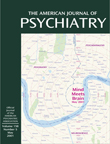Clozapine and Weight Gain
Mr. A and Mr. B were 19-year-old monozygotic (zygosity determined with microsatellite markers [4]) twins concordant for the paranoid type of schizophrenia (per DSM-IV). Before initiation of treatment with antipsychotics, both had a body mass index of 25.2 kg/m2 (Mr. A: 93 kg/192 cm; Mr. B: 92 kg/191 cm). Mr. A, whose antipsychotic treatment was initiated with risperidone (up to 5 mg/day) at age 17.4 years, gained 17 kg during an 11-month period. Mr. B was first treated at age 17.6 years with classic antipsychotics (haloperidol, chlorprothixene, and clopenthixol) for 2 months, during which time he gained 2 kg. Because of an insufficient clinical response, the twins were switched to clozapine (maximal daily doses: 500 mg and 450 mg, respectively), which they had been taking for the past 16 and 22 months, respectively.With clozapine treatment, Mr. A, who was pretreated with risperidone, gained approximately 20 kg within 9 months. In contrast, Mr. B gained almost 40 kg within 14 months. Both twins maintained a steady body weight of about 132 kg for more than 6 months. Currently, the twins weigh 131 kg (body mass index of Mr. A: 35.5 kg/m2) and 132 kg (Mr. B: 36.2 kg/m2), respectively. Weight gain since the initiation of antipsychotic treatment has totaled 38 kg and 40 kg, respectively. After initiation of clozapine therapy, both twins developed binge eating episodes (two to three per week) that fulfilled the DSM-IV research criteria for binge eating disorder as evaluated by the Questionnaire on Eating and Weight Patterns (5). Both twins reported frequent hunger, consumption of large quantities of food, and lessened satiation.
References
Information & Authors
Information
Published In
History
Authors
Metrics & Citations
Metrics
Citations
Export Citations
If you have the appropriate software installed, you can download article citation data to the citation manager of your choice. Simply select your manager software from the list below and click Download.
For more information or tips please see 'Downloading to a citation manager' in the Help menu.
There are no citations for this item
View Options
View options
PDF/ePub
View PDF/ePubGet Access
Login options
Already a subscriber? Access your subscription through your login credentials or your institution for full access to this article.
Personal login Institutional Login Open Athens loginNot a subscriber?
PsychiatryOnline subscription options offer access to the DSM-5-TR® library, books, journals, CME, and patient resources. This all-in-one virtual library provides psychiatrists and mental health professionals with key resources for diagnosis, treatment, research, and professional development.
Need more help? PsychiatryOnline Customer Service may be reached by emailing [email protected] or by calling 800-368-5777 (in the U.S.) or 703-907-7322 (outside the U.S.).

